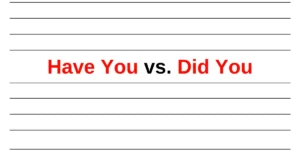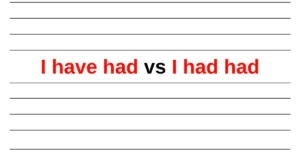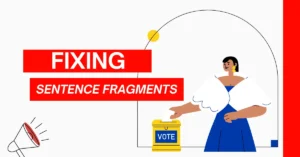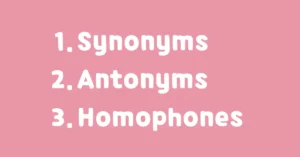C1 vocabulary refers to a level of language proficiency in English as defined by the Common European Framework of Reference for Languages (CEFR). The CEFR is a widely recognized framework that provides a way to measure language ability in a standardized manner. The C1 level is considered an advanced level of proficiency.
At the C1 level, individuals are expected to have a sophisticated and nuanced command of the English language. They can understand a wide range of complex texts, express themselves fluently and spontaneously, and use the language effectively for academic, professional, and social purposes.

C1 vocabulary includes a broad and varied set of words that allow individuals to convey ideas with precision and depth. It goes beyond basic everyday communication and encompasses words that are more specialized, abstract, and context-dependent. This level of vocabulary is often required for tasks such as writing essays, giving presentations, and engaging in discussions on complex topics.
C1 Vocabulary: 38 Adjectives
- Affable
- Affluent
- Biased
- Blunt
- Compelling
- Conceited
- Daunting
- Deprived
- Dubious
- Defiant
- Destitute
- Dexterous
- Excruciating
- Exhilarating
- Exuberant
- Elaborate
- Evocative
- Fierce
- Flimsy
- Formidable
- Foul
- Frivolous
- Gleeful
- Gullible
- Hostile
- Ingenious
- Harsh
- Immense
- Imposing
- Jinxed
- Mind-Boggling
- Persuasive
- Plausible
- Petrified
- Perceptible
- Rusty
- Tedious
- Unscrupulous
The list of C1 adjectives provided earlier represents words that are typically associated with this advanced level of vocabulary. Learners who have attained a C1 level of proficiency are capable of using such words to articulate their thoughts and opinions in a sophisticated manner.
In this article, we’re going to explore different words that describe things or people. These words are a bit fancy, and we’ll explain what they mean and give you two examples for each. Some words talk about nice things, like being friendly (“affable”) or smart (“ingenious”).
Others describe not-so-nice things, like being tricky (“deceptive”) or a bit scary (“daunting”). We’ve put together easy-to-understand explanations and examples to help you get a better idea of what these words mean. Let’s dive in and discover the interesting and sometimes tricky words in the English language.
1. Affable
- Meaning: Friendly and easy to talk to.
- Examples:
- She had an affable personality that made everyone feel welcome.
- The affable waiter made our dining experience enjoyable.
2. Affluent
- Meaning: Wealthy or having a plentiful supply of resources.
- Examples:
- The affluent neighborhood was known for its luxurious mansions.
- The company became affluent after a successful IPO.
3. Biased
- Meaning: Showing prejudice or favoritism.
- Examples:
- The news article was biased and did not present a balanced view.
- The judge was accused of being biased in the high-profile case.
4. Blunt
- Meaning: Direct and straightforward in speech or manner.
- Examples:
- She gave a blunt assessment of the project’s shortcomings.
- His blunt comments offended some members of the audience.
5. Compelling
- Meaning: Evoking interest, and attention, in a powerful way.
- Examples:
- The book was so compelling.
- The book had a compelling storyline that kept readers hooked.
Also Read: 12 Useful C1 Level English Idioms
6. Conceited
- Meaning: Excessively proud of oneself; vain.
- Examples:
- His conceited attitude alienated his colleagues at work.
- She was so conceited that she rarely acknowledged others’ achievements.
7. Daunting
- Meaning: Intimidating or discouraging through perceived difficulty.
- Examples:
- The daunting task of climbing the mountain seemed impossible at first.
- Starting a new business can be a daunting challenge.
8. Deprived
- Meaning: Lacking in essential material and cultural benefits.
- Examples:
- She claimed that she had been deprived of her freedom/rights.
- Growing up in a deprived environment affected her future opportunities.
9. Dubious
- Meaning: Hesitating or doubting; skeptical.
- Examples:
- His dubious explanation raised doubts about the authenticity of the story.
- The financial proposal seemed dubious, and investors were cautious.
10. Defiant
- Meaning: Resisting authority or challenging someone openly.
- Examples:
- The defiant student refused to follow the teacher’s instructions.
- Despite the warnings, he remained defiant and continued his rebellious behavior.
11. Destitute
- Meaning: Extremely poor; lacking the basic necessities of life.
- Examples:
- The earthquake left many families destitute and without shelter.
- The charity aimed to help the destitute population with food and clothing.
12. Dexterous
- Meaning: Skillful and adept, especially with the hands.
- Examples:
- The dexterous artist crafted intricate designs with precision.
- His dexterous fingers quickly mastered the musical instrument.
13. Excruciating
- Meaning: Extremely painful or intense.
- Examples:
- The patient experienced excruciating pain after the surgery.
- Watching the team lose in the final was an excruciating experience for the fans.
Also Read: 39 Advanced American English Phrases For Daily Use
14. Exhilarating
- Meaning: Making someone feel very happy
- Examples:
- The breathtaking view from the mountaintop was truly exhilarating.
15. Exuberant
- Meaning: Full of energy, excitement, and enthusiasm.
- Examples:
- Her exuberant personality lit up the room.
16. Elaborate
- Meaning: Involves many carefully arranged parts; detailed and complicated.
- Examples:
- The architect presented an elaborate plan for the new building.
- The chef prepared an elaborate meal for the special occasion.
17. Evocative
- Meaning: Bringing strong and pleasant memories, ideas, feelings, or images to mind.
- Examples:
- The old photograph was evocative of cherished childhood memories.
- The music was evocative, stirring deep emotions in the audience.
18. Fierce
- Meaning: Intensely aggressive or determined.
- Examples:
- The fierce competition among the teams made the tournament exciting.
- The tiger’s fierce gaze intimidated onlookers at the zoo.
19. Flimsy
- Meaning: Lacking substance or strength; easily damaged or destroyed.
- Examples:
- The argument presented was based on flimsy evidence.
- The flimsy bridge couldn’t withstand the weight of heavy vehicles.
20. Formidable
- Meaning: Inspiring fear or respect through being impressively powerful or capable.
- Examples:
- The army faced a formidable opponent in the battle.
- Her formidable skills as a negotiator led to a successful agreement.
21. Foul
- Meaning: Offensive to the senses; unpleasant.
- Examples:
- The foul smell coming from the garbage bin was unbearable.
- The athlete was penalized for a foul during the game.
22. Frivolous
- Meaning: Lacking in seriousness; not having any serious purpose or value.
- Examples:
- Spending the entire day on frivolous activities, he ignored his responsibilities.
23. Gleeful
- Meaning: Full of joy or exultation.
- Examples:
- The children were gleeful when they heard about the surprise party.
- Her face lit up with a gleeful expression when she received good news.
24. Gullible
- Meaning: Easily deceived or tricked because of being too trusting.
- Examples:
- The scam artist took advantage of the gullible elderly woman.
- Being gullible, he fell for the false promises of the fraudulent scheme.
25. Hostile
- Meaning: Unfriendly, antagonistic, or opposed.
- Examples:
- The two nations had a long history of hostile relations.
- The hostile attitude of the coworker created a tense work environment.
26. Ingenious
- Meaning: Clever, inventive, and original.
- Examples:
- The ingenious invention revolutionized the way people communicate.
- Her ingenious solution to the problem impressed everyone.
27. Harsh
- Meaning: Severe, rough, or unpleasant in manner or appearance.
- Examples:
- The harsh winter weather made it difficult to travel.
- His harsh criticism demoralized the team.
28. Immense
- Meaning: Extremely large or great, especially in scale or degree.
- Examples:
- The desert stretched out before them, an immense and desolate landscape.
- The project required immense effort and collaboration.
29. Imposing
- Meaning: Grand and impressive in appearance.
- Examples:
- The imposing castle stood on the hill, dominating the landscape.
- Her imposing presence commanded attention in the boardroom.
30. Jinxed
- Meaning: Believed to be subject to bad luck or a curse.
- Examples:
- The team felt jinxed after a series of unexpected losses.
- Every time he wore that shirt, something went wrong—it was like it was jinxed.
31. Mind-Boggling
- Meaning: Extremely complex, confusing, or difficult to comprehend.
- Examples:
- The mind-boggling concept of time travel fascinated scientists.
32. Persuasive
- Meaning: Capable of convincing or influencing others effectively.
- Examples:
- The persuasive speaker convinced the audience to support the cause.
- Her persuasive arguments swayed the jury in the courtroom.
33. Plausible
- Meaning: Seeming reasonable or probable; believable.
- Examples:
- The scientist presented a plausible explanation for the unusual phenomenon.
34. Petrified
- Meaning: So frightened that one is unable to move; literally turned into stone.
- Examples:
- The loud noise in the dark forest left her petrified with fear.
- He was petrified by the sight of the ghostly figure.
35. Perceptible
- Meaning: Able to be seen, heard, or noticed.
- Examples:
- There was a perceptible change in the atmosphere before the storm.
- The improvement in her skills was perceptible to everyone.
Students Also Read: 15 C1 Vocabulary Words To Sound Smarter
36. Rusty
- Meaning: Covered with rust; lacking in skill or experience due to inactivity.
- Examples:
- The old bike had a rusty frame and creaky wheels.
- After years of not playing the guitar, he found his skills were rusty.
37. Tedious
- Meaning: Boring, monotonous, and tiresome.
- Examples:
- The tedious task of data entry made the employees restless.
- The lecture on the subject was long and tedious.
38. Unscrupulous
- Meaning: Lacking moral principles; unethical or dishonest.
- Examples:
- The unscrupulous businessman cheated his partners out of their share.
- Unscrupulous practices led to the downfall of the once-respected company.
Also Read:
Explore More:
- Well vs. Good: What’s the Difference and When to Use Each
 What is the difference between good and well. These two words might seem similar, but they’re used in …
What is the difference between good and well. These two words might seem similar, but they’re used in … - Have You vs. Did You: What’s the Real Difference?
 Imagine you’re meeting a friend in the evening, and you want to ask if they …
Imagine you’re meeting a friend in the evening, and you want to ask if they … - Difference Between I have had and I had had
 Have you ever found yourself tangled in the web of “I have had” and “I …
Have you ever found yourself tangled in the web of “I have had” and “I … - Understanding and Fixing Sentence Fragments
 In this lesson, you will be learning about sentence fragments. Ever written something that looks like …
In this lesson, you will be learning about sentence fragments. Ever written something that looks like … - Synonyms, Antonyms, and Homophones: Boost Your Vocabulary!
 Are you ready to take your English speaking skills to the next level? One of …
Are you ready to take your English speaking skills to the next level? One of …




